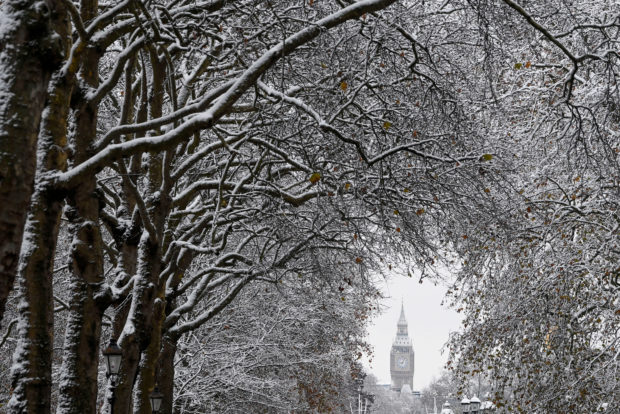Heavy snow disrupts UK travel; three boys die after falling into lake

Trees are covered in snow in front of The Elizabeth Tower, more commonly known as Big Ben, as cold weather continues, in London, Britain, December 12, 2022. REUTERS/Toby Melville
LONDON — Heavy snowfall blanketed parts of Britain on Monday, disrupting airports, train networks and roads, and three young boys died after falling into an ice-covered lake as the country recorded its coldest night of the year so far.
Parts of London’s underground network were suspended or faced delays, while motorways were gridlocked due to snow. London’s Gatwick and Stansted airports warned flight schedules could be disrupted.
The Met Office issued a yellow weather warning for snow and ice in London and south-east England, with ice and fog warnings in other parts of England and the whole of Northern Ireland.
Temperatures dropped below -15 degrees Celsius (5 degrees Fahrenheit) in northern Scotland, with the Met Office confirming it was the coldest night of the year. Further warnings in Scotland and north-east England for potential disruption caused by weather will start at midnight on Tuesday.
Britain’s National Grid issued a notification to prepare two winter contingency coal plants, but later cancelled the standby notices as higher nuclear output and wind speeds reduced the chance of energy shortages.
Article continues after this advertisementThe snow caused problems for commuters and holidaymakers at the start of a fortnight when rail workers and border officials plan industrial action.
Article continues after this advertisementSeveral train operators advised customers not to travel, while emergency services said it was important people take care in the potentially hazardous conditions.
Three boys died and a fourth – aged six – was in critical condition after they fell into an ice-covered lake in Solihull, central England, on Sunday afternoon, as emergency services continued to search the lake to check if anyone else had fallen in.
“The boy’s deaths are a tragedy beyond words,” Richard Stanton from the local fire and rescue service told a news conference.
“Yesterday’s incident is a stark reminder to us all of the dangers of open water, especially during the winter months.”